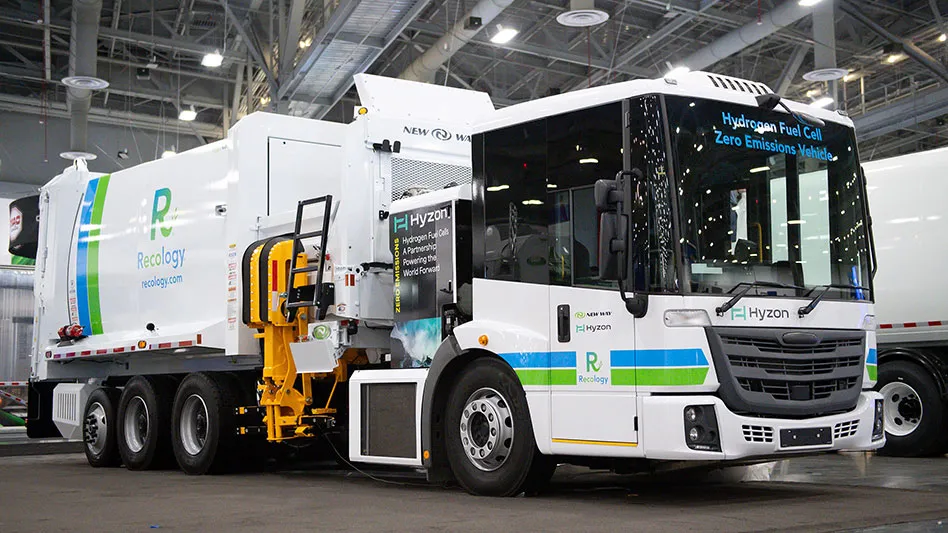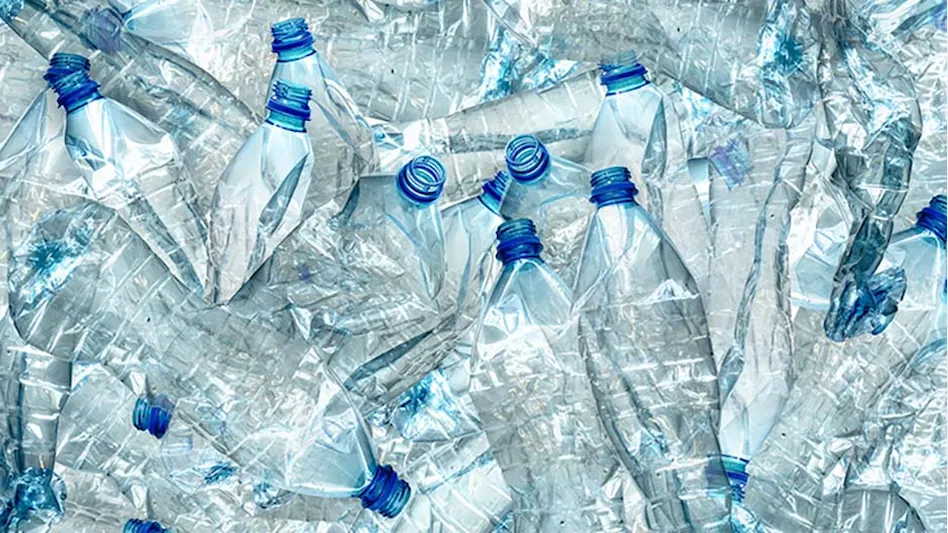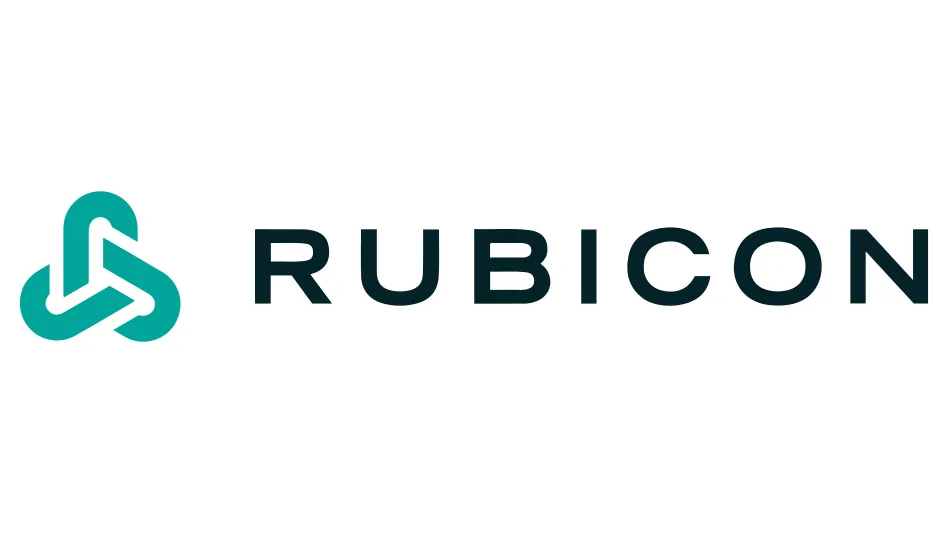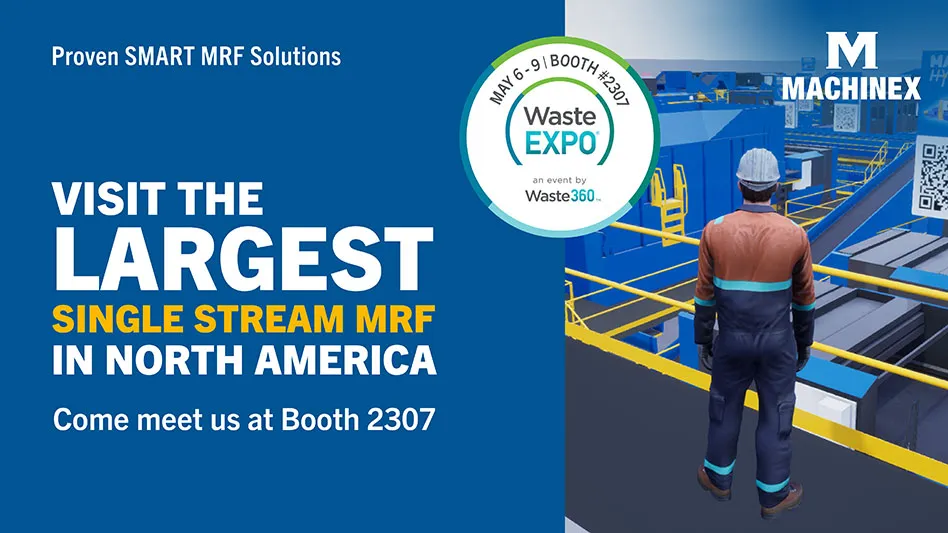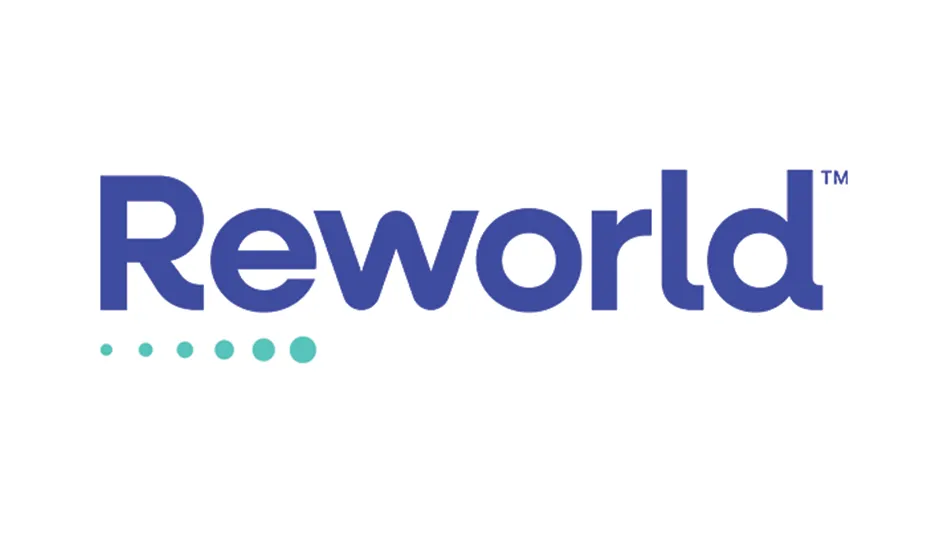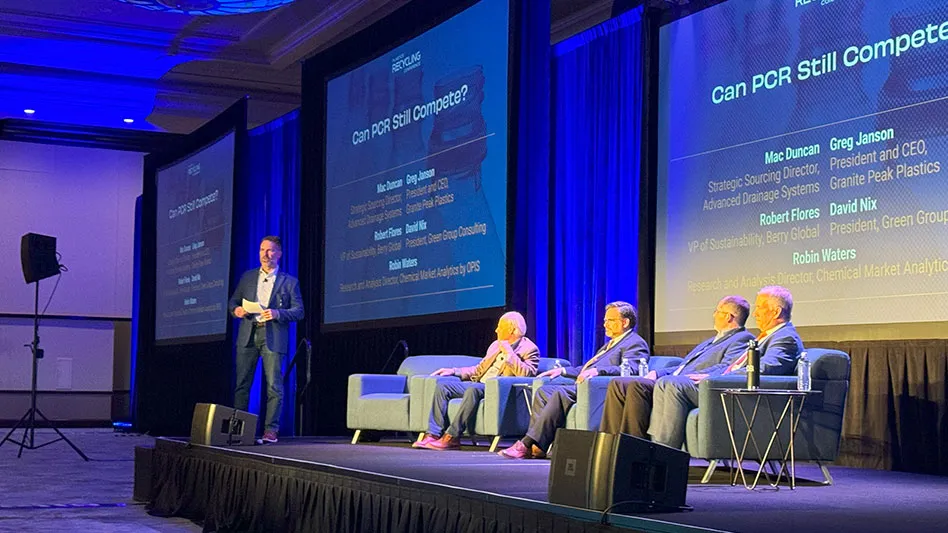
Photo by DeAnne Toto
Among the recurring topics of discussion at the 2024 Plastics Recycling Conference, hosted by Resource Recycling in partnership with the Association of Plastic Recyclers, was the effect excess virgin plastics production has on demand and pricing for recycled resins. But that is just one of many headwinds plastic recyclers in the U.S. face.
Virgin and off-spec resins flood the market
Greg Janson, CEO of St. Louis-based Granite Peak Plastics, who moderated the session Can PCR Still Compete, said the wide availability of off-spec virgin plastics has led to numerous challenges for recyclers.
Panelist Robin Waters, who is research and analysis director for the Circular Plastics Service at Chemical Market Analytics by OPIS, headquartered in Gaithersburg, Maryland, said too much virgin plastics capacity has been chasing too little demand, which has been exacerbated by regional actions. Petrochemical producers in the U.S. and Middle East have fewer export options as China expands its petrochemical production capacity.
The global price of virgin plastics is set by naphtha-based producers, which historically has benefitted the U.S. and Middle East, where production is ethane-based and less expensive. Waters said naphtha-based plastics production will continue to set the price for plastics, with virgin plastic production continuing to dominate through 2050.
As the world transitions to electric vehicles and gasoline and fuel demand are reduced, he said crude to chemicals will become the focus of petrochemical companies. However, gasoline demand could decline faster than chemical demand grows, yielding a lower price for plastic in the meantime. Once oil production adjusts to the new norm, that will lower naphtha supply and yield higher prices for virgin plastics, widening the gap with postconsumer resin (PCR) prices.
Waters added that if the cost of carbon emissions gets factored into the economics of virgin plastic production prior to that transition, that could increase the virgin floor price and the gap with PCR.
As virgin production increases, so does the availability of off-spec resin. Panelist David Nix of Pittsburgh-based Green Group Consulting said true wide-spec resin can be anywhere from 5 percent to 10 percent of a petrochemical plant’s production, though the proportion of production that results in wide-spec resins depends on the number of products a petrochemical company makes. “The more products you have, the more off-spec you will create,” he said.
“PCR cannot compete with wide-spec.”
Voluntary commitments have yet to move the needle
In the face of rising virgin and off-spec production, Nix advocated for recycled-content legislation similar to what is in place in New Jersey to help drive demand for PCR.
Indiana-based Berry Global Inc.'s Robert Flores said his company had “good news and bad news” regarding its use of PCR. “We have had more than 50 percent growth in our use of PCR since 2019,” he said, adding that PCR comprises less than 5 percent of the plastics the company used throughout North America.
Flores said brands have not had the risk tolerance historically to use mechanically recycled high-density polyethylene and polypropylene, even if the PCR has a letter of no-objection from the U.S. Food and Drug Administration. However, in 2023, Berry started to use chemically recycled content, which should appeal to brands that have been reluctant to use mechanically recycled PCR.
When Janson brought up that PCR rarely is purchased using long-term contracts, Flores said that Berry doesn’t use long-term contracts to procure virgin plastics either. However, Mac Duncan, strategic sourcing at Advanced Drainage Systems (ADS), Hilliard, Ohio, said the company uses contracts for its virgin and scrap purchasing to ensure security of supply for its pipe and recycling plants.
While a number of brands have made voluntary commitments to increase recycled content in their plastic packaging by 2025, Flores said, “It’s basically 2025 now; we need to start these projects now,” though that has not necessarily been the case.
Waters said mandating recycled content in packaging would result in more demand than the voluntary commitments that have been made to date, which Flores agreed with.
Nix said C-suite executives at consumer brand companies also should be penalized if their companies fail to meet recycled-content mandates, which is the case in Europe.
Waters cautioned against implementing legislation that “eats away at the efficiencies in the system.”
Without recycled-content mandates, however, he said, “As long as we are swimming in virgin molecules, it will keep recycled plastics prices depressed.”
In the session The State of Plastics Recycling, Steve Alexander, president and CEO of the Washington-based APR, said the association began calling for mandated recycled content in 2006. “If you don’t have markets, what the hell are you going to do?”
Alexander said virgin overcapacity issues cannot be addressed without leveraging PCR demand, adding that reclaimers also would benefit from long-term contracts and products and packaging that are designed to be recyclable.
Supply irregularities
The APR’s Alexander noted the variability that exists among curbside recycling programs in the U.S. and the relatively low recycling rates for postconsumer plastic packaging, saying, “We cannot recycle if we don’t get the material we need. We have the capacity to take the recycling rate to 43 percent if we had the supply."
The APR wants to work with cities on improving collection efficiency, he said. “If we can get consistency across the board about what programs are taking in, then MRFs [material recovery facilities] understand how many bales they can make, and reclaimers can guarantee supply.”

Scott Saunders, general manager of KW Plastics, Troy, Alabama, also speaking in The State of Plastic Recycling session, said the industry has failed in terms of private-public sector collaboration. “How do we convince cities to get started” establishing curbside recycling programs that help to enable material circularity when “the linear supply chain has proven most cost-effective in terms of dollars and cents” he asked.
That session’s moderator, Nina Bellucci Butler of California-based Stina Inc. said recyclers are "hamstrung in every single way” and called for more honesty regarding the economic issues that exist throughout the value chain.
Alexander said the plastics recycling industry is still in the “embryonic stage” of its development, though it has an “inordinate amount of pressure” being placed on it. “We need things in place to ensure supply and demand," he said.
Saunders said the 2024 market has all plastic recyclers fighting to realize efficiencies. “Today, all conversations with brands are about lowering costs. We’ve come down 45 to 60 percent at a time when our costs are rising,” he said.
Republic Services President and CEO Jon Vander Ark was enthusiastic about the future of plastic recycling. The Phoenix-based waste management company opened the first of five Polymer Centers it plans to build throughout the U.S. late last year in Las Vegas. The Polymer Centers will process plastic bottles, jugs and containers collected from homes and businesses to produce recycled polyethylene terephthalate (rPET) flake and color-sorted high-density polypropylene (HDPE) and polypropylene (PP) that is ready for use in new packaging. He said the facilities will extend the life cycle of plastic packaging and help turn plastic bottles into new bottles six to seven times.
Vander Ark said the model will enable Republic to bring “dumbed-down” recycling facilities to underserviced markets knowing that the plastics recovered at these MRFs can be further sorted and processed at its Polymer Centers. “We need to think about regional models,” he added, noting that previous plastic recycling companies have not failed because of underperforming technology but because supply has been difficult to secure.
Fifty customers have told Republic they will buy every molecule that comes out of all five locations, Vander Ark said. The company announced supply agreements with Los Angeles-based Circularix, which produces food-grade recycled PET (rPET) pellets from recycled PET flakes at its site in Hatfield, Pennsylvania, and with the Coca-Cola Co., which has committed to use at least 50 percent recycled material in its packaging by 2030. Vander Ark said 25 percent of the output from its Las Vegas site will supply Coca-Cola and an equal percentage will be used to supply Circularix.
Saunders said KW will continue to invest in its processing capabilities “to be ready when the headwinds turn into tailwinds.”
The Plastics Recycling Conference was March 25-27 in Grapevine, Texas, at the Gaylord Texan Resort and Convention Center.
Latest from Recycling Today
- Pure Loop celebrates ISEC shredder-extruder at NPE
- New Alpla PET wine bottle cuts carbon emissions
- Ascend Elements, Call2Recycle to offer customized EV battery services
- Novelis quarterly, full-year net sales down; CEO reports ‘strong improvements’
- Meeting the decarbonization challenge
- Cyclic Materials expands leadership team
- Paper cup acceptance at US mills reaches new milestone
- EPA announces $3B to replace lead service lines

